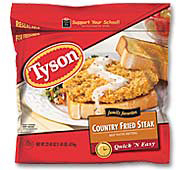What
FOOD is green?
Company reports lie, research is biased or severely blinkered, that is, until
now...
Centre
Info, a
Swiss company that specialises in social and environmental rating tools for
investors, has created the "Envimpact" rating which weighs
the most environmentally-sensitive phase in the life cycle of a product (or
service) delivered by 140 corporate sectors and is hoping to expand the use
of the rating system in the financial services sector also. (Report
by Terradaily)
LaRevueDurable
(.com all
in french), a Swiss-based environmental magazine, is calling for the system
to be adopted as a label categorising publicly-quoted companies or investment
funds, similar to those rating the energy efficiency of refrigerators.
That would help shareholders
or small savers make choices with climate change in mind, in turn influencing
corporate policy, the magazine argues.
In the Food sector
they have taken into account items like forest clearance for grazing land, emissions
from cattle feed, meat processing and the large amounts of methane naturally
produced by cattle meat products.
(Report about Food sector by Terradaily). Below is my basic review of this
report.
COMPARING
FOOD AGAINST CAR PRODUCTION EMISSIONS
USING RATINGS GIVEN BY THE 'CENTRE INFO'

Tyson Foods
(big in North America for their meat based products) |

Fiat
(equal with Renault as the most environmentally
least damaging manufacturers of cars)
|
Tyson
Foods produce
1,600
units of CO2
using the Envimpact rating
|
Fiat
produce
2,000
units of CO2
using the Envimpact
rating
|
SHOCKING
RESULT!!
MEAT PRODUCTION IS ALMOST AS ENVIRONMENTALLY
DAMAGING AS MAKING CARS |
FOR COMPARISON SEE ALSO WHAT A BIG DAIRY GROUP PRODUCES

Danone
(producers of that famous 'good bacteria' yogurt, Actimel) |
produce
900
units of CO2
using the Envimpact rating
|
Shows
the difference processed products have when freshness can be
controlled.
|
Now,
imagine
this...
1 kilogram of food = Emissions for an average
car when it travels a certain distance.
Then get this, by LaRevueDurable magazine.
|
|
BEEF
Ruminants
- grazing animals (cows, sheep, camels)
production of one kilo of cut veal produces
as much greenhouse gas emissions as traveling
220 kilometres
(137 miles) by car.
|
|
|
PORK
Non Ruminants
(pigs)
turns out to be much more environmentally friendly.
One kilo of pork is equivalent to a car journey of just
20 kilometres
|
|
|
CHICKEN
Non Ruminants
(chicken)
while a kilogram of chicken is worth just
10 kilometres.
|
|
|
by comparison
Dairy products such as one kilogram of yogurt pumps out as much
as driving
8 kilometres
(shows how processed chicken is...)
|
Result:
Shop locally to start with.







